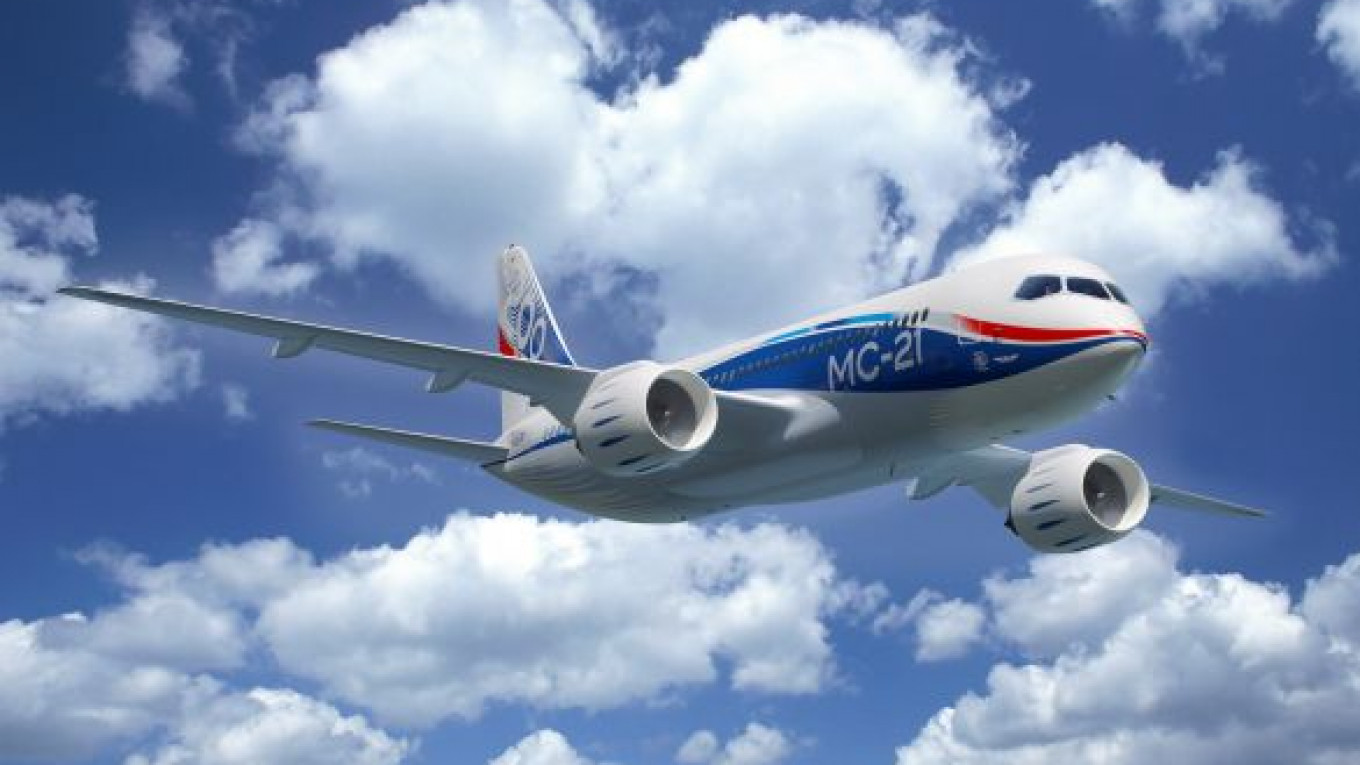The government plans to offer guarantees for bank debt to help market a narrow-body aircraft being developed by state-owned United Aircraft Corp., the company's CEO said.
UAC has been seeking to develop the MS-21, a single-aisle plane that would challenge Boeing and Airbus. And it aims to attract new airlines that haven't bought planes of that size, UAC head Mikhail Pogosyan said in an interview at the Farnborough Air Show.
"You create a system of sale financing for the aircraft you're manufacturing," Pogosyan said, speaking through an interpreter. "We're actively working on creating an export agency in the same way as in the Western countries."
In the United States, the Export-Import Bank guarantees bank loans to some foreign airlines to help support job creation at home.
France, Germany, Britain and Spain also have export credit agencies to help support sales of Airbus planes.
The MS-21, seating 150 to 212 passengers, will offer a choice of engines by United Technologies' Pratt & Whitney or a Russian-developed engine.
The aircraft will compete in the same category as Boeing's 737 and Airbus' A320. It will also go up against a 168-seat model, the Comac C919, being developed in China, which is set to enter into service in 2016.
Initially, the plane will be flown by domestic airlines and those from countries of the former Soviet Union. Pogosyan said he expects Southeast Asia to be the most likely region where the program will flourish in early years.
"We aren't trying to repeat what Boeing and Airbus or Comac are doing in the market," he said.
The MS-21 will have an all-composite wing, instead of the traditional aluminum now used on narrow-body models. Pogosyan said that will give the plane a performance advantage.
The strongest prospects may be with new airlines, which may have difficulty getting delivery slots at Airbus and Boeing, where mounting backlogs can mean a wait of several years for a plane, particularly narrow-bodied ones, he said.
"Certainly, many airlines will be going for Boeing and Airbus," Pogosyan said. "But there are quite a number of new airlines emerging in the Pacific region that will want to have new products, and these new airlines would have to join a queue that lasts seven or eight years.
"They want new products right now, so this may be an advantage for us."
Aeroflot took delivery of its latest Airbus A330-300, bringing its fleet of the medium-range airliners to 18, the state-owned carrier said Friday.
The aircraft, named the Lev Yashin after a Soviet footballer, is one of a batch of 11 A330-300s ordered by the airline in 2010.
The A330-300 is a medium- to long-range twin-engine airliner used for long-haul flights.
Expanding its long-range fleet will allow Aeroflot to consolidate its position in the international market.
Aeroflot is the only one of Russia's three largest airlines to fly Airbus aircraft. Its fleet of 121 aircraft is thought to be the youngest in Europe.
Aeroflot is set to take delivery of the first MS-21, being produced by Irkut Corp., a branch of UAC, by 2017.
The MS-21 is the second new airliner produced in Russia since the Soviet collapse. The first is the Sukhoi Superjet 100.
A Message from The Moscow Times:
Dear readers,
We are facing unprecedented challenges. Russia's Prosecutor General's Office has designated The Moscow Times as an "undesirable" organization, criminalizing our work and putting our staff at risk of prosecution. This follows our earlier unjust labeling as a "foreign agent."
These actions are direct attempts to silence independent journalism in Russia. The authorities claim our work "discredits the decisions of the Russian leadership." We see things differently: we strive to provide accurate, unbiased reporting on Russia.
We, the journalists of The Moscow Times, refuse to be silenced. But to continue our work, we need your help.
Your support, no matter how small, makes a world of difference. If you can, please support us monthly starting from just $2. It's quick to set up, and every contribution makes a significant impact.
By supporting The Moscow Times, you're defending open, independent journalism in the face of repression. Thank you for standing with us.
Remind me later.






